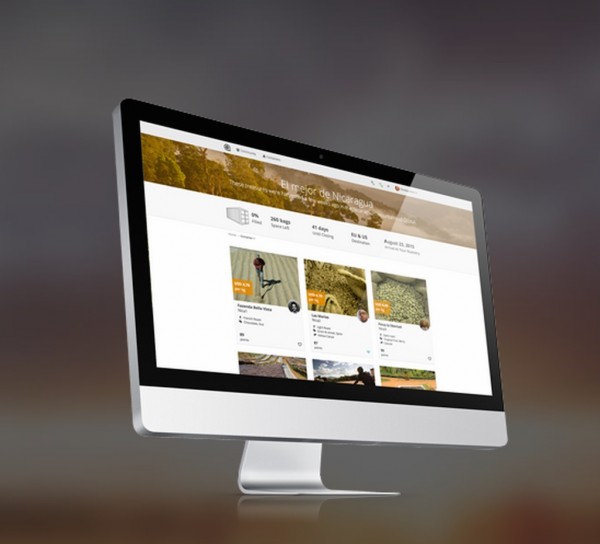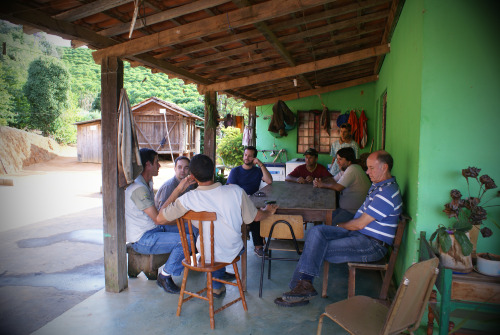The relationship between buyers and producers is in many ways the engine that drives upmarket specialty coffee, especially as traceability, farm to cup, direct trade and related concepts are gaining traction among conscientious consumers. Of course, this relationship can be a fuzzy one, naturally limited by lack of direct or meaningful access between these two key, independent links in the specialty coffee chain.
A coffee company debuting this week called Algrano is working to develop those relationships through a technologically driven platform that’s largely new to the coffee world. The Swiss startup is essentially providing an online green coffee marketplace where sellers — in this case, coffee producers — can interact with green coffee buyers, who then have the opportunity to provide feedback and offer financial incentives for quality improvements. Moreover, costs throughout the sale, export and delivery are transparent to both parties.
The company, whose name borrows from the Spanish phrase “vamos directo al grano” (loosely, translated, “let’s get straight to the point”), is officially launching tomorrow at the Nordic World of Coffee event in Gothenburg, Sweden, following a two-week launch tour throughout part of Europe. Algrano is led by four Swiss friends with very different backgrounds (Gilles Brunner, Christian Burri, Raphael Studer and Fabio Kuhn), and the team has been building grassroots support throughout the coffee industry since receiving funding through two global startup competitions, Startup Chile and Startup Brasil, in 2013.
We asked Brunner about the marketplace concept, and how Algrano is using technology to bridge the inherent communication gaps between producers and buyers.
Can you tell us more about how the founders of Algrano got into the coffee business?
I worked three years in the sustainability department of ECOM, a global coffee merchant. I worked two years at the headquarters in Switzerland on the development of technical assistance projects in different countries and spent one year in Brazil developing the newly created Sustainable Management Services (SMS) division of ECOM Brazil. Raphael and Christian’s trip into coffee started in late 2013 when we initiated the development of Algrano.
What producers are you launching with?
We are working with five producers in Nicaragua, from the Ocotal and Jinotega region — all dedicated specialty coffee producers. Among them are Cup of Excellence finalists. We met them in May in Nicaragua where we organized a workshop to present the platform.
What other producers do you envision working with, or are there specific regions you’re focused on?
We have deep relationships with producers from Brazil. We have been working closely with APAS, a small Fairtrade producers association of 40 members, which produces high-quality specialty coffees in the Serra da Mantiqueira micro-region, in South Minas Gerais. They created their farm profiles on Algrano and they will present their freshly harvested coffees beginning August/September on Algrano.
How does the communication on the Algrano platform work on the producer’s end? And how do you address issues such as internet access and language differences?
Producers’ access to internet was Algrano’s first hypothesis to be tested. We built a first version of Algrano and presented it to all FairTrade coffee associations from Brazil in April 2014. The objective was to test the ability and willingness of producers to use such a platform. The feedback from this experience was very positive, it was very easy for them to create profiles, and they were all convinced and excited by the concept.
Moreover, the platform is available in English, German, Spanish and Portuguese, and additionally includes built in Google Translate API services that allow producers and roasters to understand each other. Alessandro, a young Brazilian smallholder from APAS, told us he was using Google Translate to communicate via email with a roaster in Germany, and Eufrasio Lima, a smallholder from the Bahia region, recently contacted Algrano on Twitter because he heard about us on social media and liked our concept.
We decided to start algrano in Latin America because producers tend to be more connected to the internet, and we will further build online tools for producers to easily connect and interact with roasters.
How small can purchase volumes be?
There is no miminum-quantity restriction on Algrano. Roasters can, for example, buy one bag of one lot and one bag of another lot. Algrano then consolidates the orders. Roasters can instantly see the total cost of the selected coffees delivered to their roastery.
You mention optional premiums as quality incentives. How would that process actually work? Is there a system for quality improvements in place? And is it transparent?
On the platform, when choosing a coffee, roasters can decide to add an additional premium price per kilogram that will be paid directly to the grower. The power of Algrano is that all the actors are on the platform. It allows two-way transparency: Not only do roasters get the information about the price paid to growers, but growers have access to this exact same information online. Roasters and growers both have access to a full price breakdown — price paid to the farmer, exporter fees, freight costs, logistics costs at the destination and Algrano’s service fee.
Transparency is at the heart of Algrano’s model.
Nick Brown
Nick Brown is the editor of Daily Coffee News by Roast Magazine.








Comment